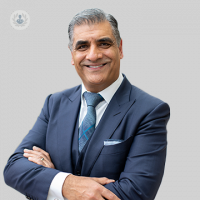Understanding your heart: Standard vs. Keyhole bypass surgeries
Written by:Treating coronary artery disease (CAD) has seen remarkable advancements with the emergence of keyhole coronary artery bypass surgery, presenting a minimally invasive alternative to the conventional coronary artery bypass graft surgery (CABG). In his latest online article, Mr Inderpaul Birdi offers valuable insights into comparing the standard and keyhole methods, aiming to empower patients in making informed decisions regarding their cardiac health.

Standard coronary artery bypass graft surgery (CABG) has been the traditional approach, involving a sternotomy procedure. This method necessitates a large chest incision and division of the breastbone to access the heart for graft placement. Grafts, typically harvested from the patient’s veins or arteries, like the saphenous vein from the leg or the internal mammary artery, are used. The direct sight of the heart during surgery provides precise control but requires an extended recovery period, longer hospital stays, and often involves postoperative discomfort. The wired breastbone takes about 12 weeks to fully stabilise.
On the other hand, the keyhole coronary artery bypass graft presents a less invasive approach. This technique employs smaller chest incisions, avoiding sternotomy and offering a more minimally invasive access point. Similar to standard CABG, it utilises the patient’s own veins or arteries for grafting. While it offers limited visibility during the surgery, specialised instruments and cameras compensate for this limitation, enabling precise surgery. The keyhole method facilitates a shorter recovery period, reduced hospital stays, and less postoperative discomfort, with incisions typically healing within 7-10 days.
The benefits of keyhole coronary artery bypass graft surgery are evident. Its minimally invasive nature reduces surgical trauma, infection risk, and results in smaller, less noticeable scars. The faster recovery time allows patients to return to regular activities earlier, significantly improving their overall quality of life. Moreover, the reduced postoperative discomfort and lower risk of infection due to smaller incisions further add to its appeal.
When deciding between standard and keyhole coronary artery bypass graft surgery, various factors need consideration. The patient's health condition, the extent and location of CAD, and the expertise of the surgeon are pivotal in choosing the suitable approach. Consulting with a qualified minimally invasive surgeon is crucial for personalised advice tailored to an individual’s specific health condition and needs.
The decision-making process between standard and keyhole coronary artery bypass graft surgery underscores the importance of informed discussions with qualified professionals. It's essential for patients to understand the nuances of each approach and work closely with healthcare experts to determine the most suitable treatment plan for their cardiac health.
Mr Inderpaul Birdi is a distinguished cardiothoracic surgeon with over 30 years of experience. You can schedule an appointment with Mr Birdi on his Top Doctors profile.


